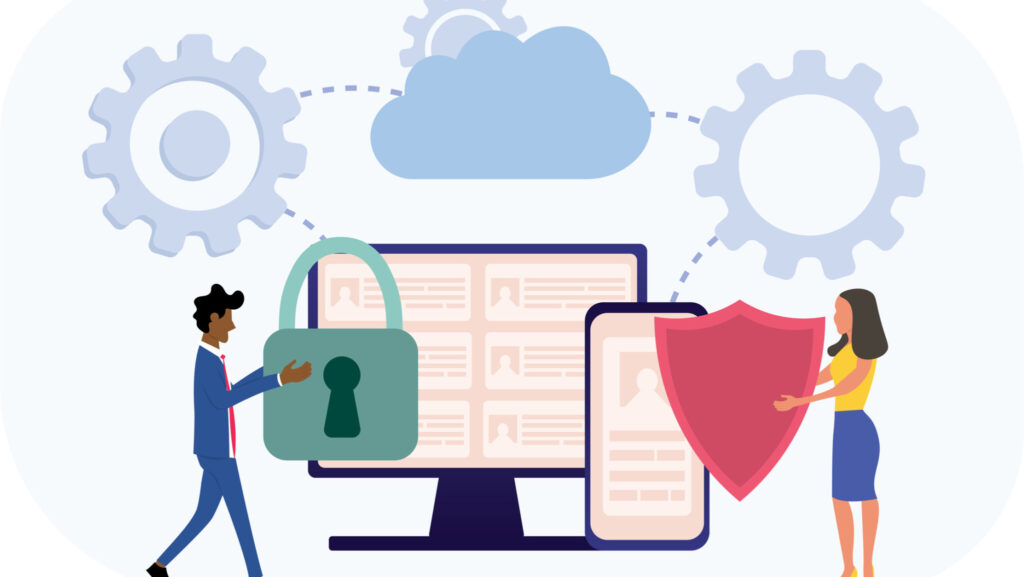
Congratulations on choosing dentistry. It is an exciting time for the industry with the explosion of technology designed to aid diagnostics, treatment planning, case acceptance, and more.
Although there’s abundant technology to advance your practice, it’s also important to recognize that with connectivity comes risk, especially when dealing with sensitive personal health information (PHI). While your technological savvy is a great asset, understanding the nuances of privacy and data security in handling PHI is equally vital.
It’s easy to think that a dental office is not a target. After all, you work on teeth, so who would want to hack you? However, as with other small businesses, cybercriminals know dental offices don’t have full-time IT support and little access to cybersecurity specialists.
They also know that the budget is small for cybersecurity, and there’s a severe lack of cybersecurity awareness training in the industry. Couple this with the fact that most offices are now highly digitized and reliant on connectivity, and you have the perfect storm for cyber-attacks. This type of scenario makes a dental office a lucrative target for extorting money by crippling the systems or stealing patient data and demanding a ransom.
Understanding Personal Health Information in Dentistry
Personal Health Information (PHI) encompasses any records or data that can identify an individual and relate to their health condition, provision of health care, or payment for health care services.
Examples of PHI in a dental practice include both paper and electronic patient records, such as:
- Health histories
- X-rays
- Intra-oral and extra-oral images
- Treatment plans
- Impressions & study models
- Billing information
- Credit card details
- Insurance details
- And more
The digitization of patient records, while efficient, poses significant risks if not properly managed. Cyber threats such as hacking, phishing, and ransomware can lead to unauthorized access and potential misuse of PHI. Understanding the sensitivity of this information and the legal and regulatory obligations is the first step in protecting your patients and your practice. Investigating your jurisdiction’s privacy laws and college regulations or guidelines is essential to ensure you are complying.
Common Cyber Threats in Dental Practices
Dental practices are increasingly targeted by cybercriminals due to the wealth of sensitive data they hold. Common threats include:
- Phishing Emails: Fraudulent emails or messages that trick staff into revealing sensitive information.
- Phishing Websites: Fake websites designed to steal credentials or deliver malware.
- Ransomware: Malware that encrypts and steals data, demanding a ransom for access.
- Data Breaches: Unauthorized access to data due to human error and weak security measures.
- Insider Threats: Employees unintentionally or maliciously compromise data security.
These threats can devastate a practice’s reputation and financial stability, not to mention the legal ramifications of data breaches. According to The Canadian Dental Association, the average cost per record for a PHI breach + credit card breach is $253.431. This number creates an unbearable outcome for most practice owners. For example, a practice with 2000 patient records would fork over $506,860 when all is said and done.
In Canada, 58% of consumers claim they will stop spending with a business for several months in the immediate aftermath of a security breach. One-fifth of consumers claim they will never return to a business post-breach2.
Cybersecurity Best Practices
To mitigate these risks, consider the following best practices:
- Regular Training: Educate yourself and your team about cybersecurity threats and safe practices. Emphasize the importance of recognizing phishing attempts and secure password management.
- Data Encryption: Encrypt PHI both in transit and at rest. This makes the data unreadable to unauthorized individuals.
- Access Controls: Implement strict access controls to ensure only authorized personnel can access sensitive data.
- Regular Backups: Maintain regular backups of all critical data to prevent loss in case of a ransomware attack.
- Update Systems: Keep all software and systems updated with the latest security patches.
- Professional Consultation: Consider hiring a cybersecurity expert to evaluate and strengthen your practice’s security measures.
Maintaining the Security of Patient and Practice Data
As a new dental graduate, embracing the responsibility of protecting PHI is as essential as caring for your patient’s oral health. Being aware of common cyber threats and implementing robust security practices can significantly reduce the risk of data breaches and cyber-attacks.
Remember, cybersecurity in dentistry isn’t just about technology; it’s about safeguarding the trust your patients place in you. Stay informed, stay vigilant, and continue to learn about cybersecurity trends and best practices. Your proactive approach will protect your practice and contribute to the dental industry’s overall integrity of patient care.
Together, we can make dentistry safer online.
References:
- Canadian Dental Association – Cyber Risk in the Dental Office, Dean Smith 2019 https://oasisdiscussions.ca/wp-content/uploads/2019/01/Cyber-Risk-in-the-Dental-Office-1.pdf
- Security Boulevard/PCIPal– What Happens to a Customer After a Data Breach https://securityboulevard.com/2023/01/what-happens-to-a-customer-after-a-data-breach/#:~:text=According%20to%20PCI%20Pal’s%20recent,to%20a%20business%20post%2Dbreach.
About the Author:

Anne Genge, Certified Information Privacy Professional, Certified Healthcare Cybersecurity Professional, Certified Healthcare Security Risk Assessment Specialist. Anne is the founder of Myla Training Co., Canada’s first-ever online privacy and cybersecurity training platform for dental professionals. With over two decades of experience, Anne has become a leading expert and trainer in this field. Anne collaborates closely with practice owners, managers, dental teams, and IT providers to ensure the safety of patients and practice data while enabling
compliance with privacy regulations. Anne can be reached at anne@myla.training or call 877-363-9229 x702.

